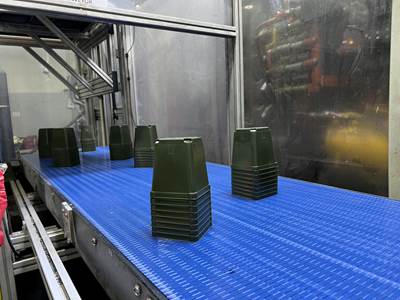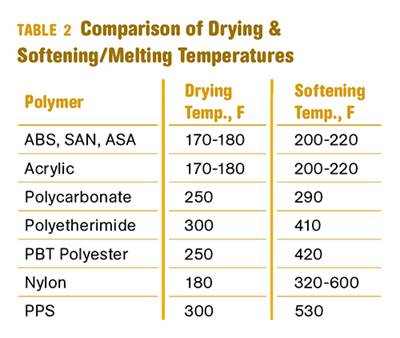Composites Innovation in North Dakota
North Dakota is not known for its trees, so one might guess that’s why it is home to a company specializing in composite building products that substitute for wood and metal.
North Dakota is not known for its trees, so one might guess that’s why it is home to a company specializing in composite building products that substitute for wood and metal. But that’s not the real story. What the rolling plains around Fargo, N.D., lack in lumber they make up in brainpower—supplied by two local universities, one college, and one technical college. “Higher education serves as ‘feeder system’ for our work force, and it helps us stay on the leading edge of technology,” says Steve Syrdal, sales manager of Tecton Products LLC. Tecton bills itself as “the world’s largest manufacturer of thin-walled, complex-shaped fiberglass pultrusions. It produces mainly window and door frames and exterior building trim, as well as frames for plastic lawn sheds and commercial reach-in freezers and coolers.
Tecton was founded in 1990 as a partnership between its president, John Jambois, and Marvin Windows and Doors of Warroad, Minn. Jambois had been a marketing executive at a vinyl extrusion company and at GE Plastics, where management had targeted building products as the greatest untapped “mega-market” for plastics. When Jambois sought to start his own company, he looked for a location in the upper Midwest to be near his partner in Minnesota. He found Fargo to be centrally located and bisected by interstate highways running East-West and North-South.
But the clincher was the proximity to an available and educated work force sufficient for 24/7 operations. Among Tecton’s 225 employees are more than 20 engineers, most of them recruited from North Dakota State University, as well 50 employees with Master’s and/or Bachelor’s degrees, 48 with two-year technical degrees, and three chemists—two of them Ph.D.s. Eighteen more employees are currently earning two- or four-year degrees with the aid of Tecton’s tuition reimbursement program.
Staffed for innovation
Tecton invested in all that know-how because Jambois believes in developing proprietary technology, both in equipment and materials formulations. Tecton designs its own products, designs and builds its own tooling, and utilizes CAD/CAM, finite-element analysis, rapid prototyping, and laboratory testing of physical properties and accelerated weathering performance.
Among Tecton’s innovations was the first FRP window frame for the builder market in the early 1990s. In 2002, it brought out frames for replacement windows. “FRP is the fastest growing segment of windows,” Syrdal states, attributing that fact to excellent insulating characteristics.
In 2001, Tecton patented the Durion finish, a smooth, weather-resistant acrylic thermoplastic that is extruded over the thermoset polyester and glass pultrusions for window and door frames. As the name suggests, Durion is durable. “I don’t like paint,” Jambois says.
Durion is used on Tecton’s newest development, which is also the first building product that it will market itself as a proprietary line. The Tecton Door System is the first-ever FRP residential entry door frame, though patio and industrial door frames are already made in FRP. It’s available with mull posts and a continuous header to integrate sidelights seemlessly, providing a better seal.
‘Doing it right’
When Jambois was starting Tecton, the U.S. EPA was pursuing new clean-air rules that would affect FRP and many other manufacturing industries. Jake Marvin, chairman of Marvin Windows and Doors, told Jambois, “Whatever we do together … do it right.” Unlike the vast majority of pultruders, Tecton pursued the expensive route of complying with EPA’s MACT (Maximum Available Control Technology) standard for controlling styrene and other volatiles. The company researched various types of thermal oxidizers that collect all the plant air and concentrate and then incinerate the styrene vapors. Tecton installed a system at its 110,000-sq-ft Fargo plant and achieved MACT certification in 1994. Syrdal says it is still the only pultruder to have done so. “We are very proud of our MACT compliance,” he states. “We believe it was the right choice for our associates, our community, and our company. Our low emissions allow us to grow our company here and in almost any community.” Tecton installed a thermal oxidizer system at its second plant, which opened last year in Salem, Va.
Read Next
Processor Turns to AI to Help Keep Machines Humming
At captive processor McConkey, a new generation of artificial intelligence models, highlighted by ChatGPT, is helping it wade through the shortage of skilled labor and keep its production lines churning out good parts.
Read MoreWhy (and What) You Need to Dry
Other than polyolefins, almost every other polymer exhibits some level of polarity and therefore can absorb a certain amount of moisture from the atmosphere. Here’s a look at some of these materials, and what needs to be done to dry them.
Read More




















